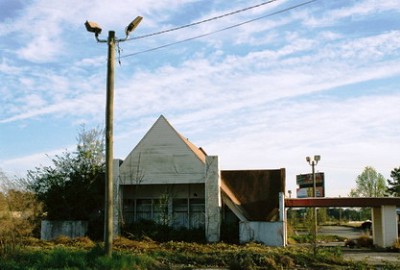
It’s nearly dusk and the sand makes it difficult to walk. You don’t know where you are. The mosquitoes swarm and you slap at them blindly, little spatters of blood on your neck and arms. But the horseflies are worse. In the distance you hear an ATV, a dog, and the crack of a rifle. A woman appears farther up the trail. She is thin, with long, black hair, and her cotton dress flutters in the cool breeze. She stops and turns her wan face toward you. You raise your hand in greeting, hoping that she can provide you with some direction, but she steps off the trail and into the brush. By the time you reach the overgrown deer trail she’d been following there will be no trace of her.
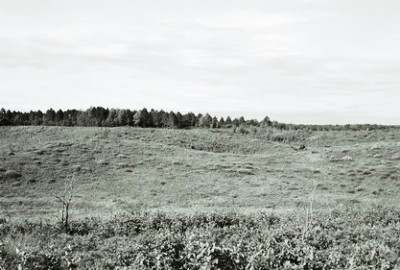
You continue, looking for landmarks; a twisted pine tree in the distance, a shallow lake off to the side. “That must be Blue Lake,” you mutter. Then, farther on, “No, THAT must be Blue Lake.” A man approaches, big and barrel-chested, a flannel jacket over soiled coveralls. A rifle rests against his right shoulder. You slow and begin to speak, but the man shakes his head and gestures vaguely toward his ear with all three of the fingers on his left hand. You form a word, but suddenly realize the futility: He is deaf. Fear settles into your shoulders, making them ache. But this does not seem to be the fear of wandering further into the darkening wilderness. You have been lost in the north woods before, in more remote places than this, in worse weather, and with much more at stake. This fear is different, somehow more dangerous because you cannot identify it.
By the time you get back to the trailer it’s almost midnight. The full moon provided barely enough light to travel by, but the tangles of vegetation finally gave way to wider, more familiar trails. Your arms, hands, neck, and face itch terribly, small welts rising on your skin.  You open the door to the musty trailer, top-of-the-line in 1955, and light the kerosene lantern. A few insects immediately begin to work their way through holes in the window screen. The door is warped and swings open with a gust of wind. You stand up and pull it shut, hard, then slide a screwdriver through two strips of metal that used to hold a sliding bolt. You sit on the bed and stare at the backs of your red, swollen hands. How long have you been out here now? Three weeks? A month? All night the fear has been building, growing stronger, more personal, more insistent. You turn off the lantern, lie back on the moldy foam pad and pull the ragged sleeping bag across your chest.
You open the door to the musty trailer, top-of-the-line in 1955, and light the kerosene lantern. A few insects immediately begin to work their way through holes in the window screen. The door is warped and swings open with a gust of wind. You stand up and pull it shut, hard, then slide a screwdriver through two strips of metal that used to hold a sliding bolt. You sit on the bed and stare at the backs of your red, swollen hands. How long have you been out here now? Three weeks? A month? All night the fear has been building, growing stronger, more personal, more insistent. You turn off the lantern, lie back on the moldy foam pad and pull the ragged sleeping bag across your chest.
You wake sweating in the night, traces of a nightmare like wisps of dark smoke on the horizon. You sit up and look out the window at the yellow moon; in a few minutes it will sink behind the pines. In the distance, a loon. A coyote. A gunshot. You get up, light the lamp, and pull a suitcase out from under the bed. You remove three thick stacks of twenty dollar bills from the others and weigh them for a moment in your palm. You pick up a pen and two crumpled manila envelopes from the cracked formica table. The addressee on the first: Mrs. Anna Lund. The addressee on the second: Mr. Bill Nichols. One stack of bills goes in each envelope. You take a few bills off the third stack and stuff them in your pocket, then throw the remainder back in the case and kick it under the bed. You’ve just turned off the lamp when you hear a wet snuffling from below the window, followed by grunts, and a series of bumps against the side of the trailer. You freeze until the noise fades into the distance and there, in what remains of the moonlight, you laugh grimly. One problem solved, another created. As you lay your head back on the damp pillow, eyes following the willowy shadows on the ceiling, you decide to wait for dawn. This is fear. This, then, is Wisconsin.
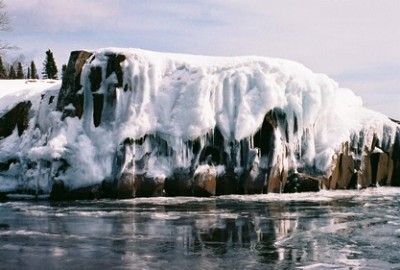
Las Vegas, Nevada: 117 degrees F. Death Valley, California: 129 degrees F. My old home, Augusta, Georgia: 100 degrees F (heat index=110). Twenty-four people dead in Phoenix, Arizona, where it's now been 100+ F for as long as anyone cares to remember. 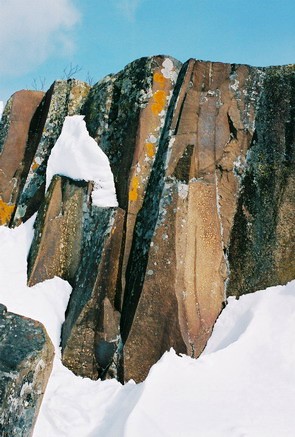 The Weather Channel running a story entitled, "Save your pet from heat exhaustion." Man, it's hot. So, here are some photos from cooler times. This is Grand Marais, Minnesota, up by the Canadian Border, sometime last February. Looks good now, doesn't it? I was cold as hell when I took these photos, a brutal north wind coming at me right off Lake Superior. But, let's forget that for now and just admire the ice. Actually, up here we didn't even make it to 70 degrees F today, so I'm not entirely sure what the rest of the country is complaining about. If you want further frosty photos I posted some others here awhile back. Just remember to keep your head down when those thunderstorms start rollin' through.
The Weather Channel running a story entitled, "Save your pet from heat exhaustion." Man, it's hot. So, here are some photos from cooler times. This is Grand Marais, Minnesota, up by the Canadian Border, sometime last February. Looks good now, doesn't it? I was cold as hell when I took these photos, a brutal north wind coming at me right off Lake Superior. But, let's forget that for now and just admire the ice. Actually, up here we didn't even make it to 70 degrees F today, so I'm not entirely sure what the rest of the country is complaining about. If you want further frosty photos I posted some others here awhile back. Just remember to keep your head down when those thunderstorms start rollin' through.
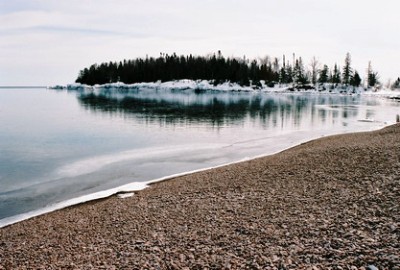

The land begins to fall away, slowly at first, then more quickly. At ever-increasing intervals patches of dark blue flash off the horizon, somewhere beyond the trees. Two strips of blacktop lead in either direction, the rolling southbound lane initially providing the traveller with no reason to believe the road will ever end. Towns rush by, their names riddles: Happy Jack, Port Sulphur, Nairn, Empire, Triumph. Clusters of small homes punctuate miles of dense foilage, refineries, and debris. Nearby are ghosts: of the Civil War, of Mardi Gras, of the Mississippi Delta. From the depths of the Delta call the ghosts of The River, as it has always been.

To the west, the Gulf of Mexico stretches out, to the east, the Mississippi River, kept in place by a tall levee. Beyond that, a slip of land and then the Gulf again. It's disorienting to look into the distance on every side and suspect that there is nothing but a vast and sultry, if unseen, expanse. Yet it can be difficult to tell land from water, the boundaries transient and mutable. When, inevitably, land and water meet, land occasionally seems to gain some slight advantage. But water waits, patient, knowing it will finally win. It always does. On Easter Sunday, 2005, the ground was in retreat as far as Venice, Louisiana.

Five hundred miles north and three generations previous a blueswoman from Louisiana looked at the black water of the same river and saw similar earthworks built against it. Staring into the roiling depths that flowed through her country, her body, and her soul, she moaned, "If it keeps on rainin', levee's goin' to break." Rivers, towns, levees, and lives may seem fixed and permanent, but they are not.Memphis Minnie knew this 76 years ago and was moved to sing about it. We forget, yet, someday, we will not.
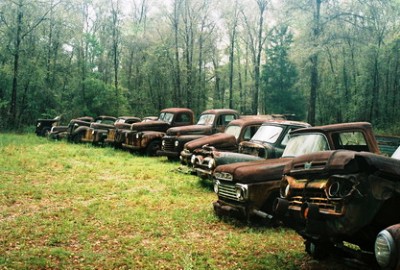
It’s 7AM and I’d like to be somewhere else. Instead, I’m standing behind the geology building on the campus of a Big 10 University. It’s Saturday and a few of us are drinking coffee or eating donuts. Almost everyone is grumbling about the apparent waste of a perfectly good Saturday. It’s only late spring, but the morning is muggy and I can feel sweat on my forehead and upper lip. As I listlessly pace up and down the sidewalk I wish I was back in bed. At one point, I’m at the far end of the walk, just about to turn around, when I see a man on the other side of the parking lot. Our eyes meet for an instant and he immediately begins to shuffle toward me, not quite limping, but not walking with complete ease, either. I stop and wait; I’ve got nothing else to do.
“I’m Richard,” the man says as he approaches me. I can see that his faded blue eyes are watery and pinkish and a bit clouded. “I lost half my penis in Vietnam, but that doesn’t make me any less of a man than you.” He offers me his hand, as if to affirm his manhood, and I take it, if only to hide my sudden alarm. Richard clasps my palm, squeezes, and shakes it vigorously. “You ever read Dostoyevsky? Fyodor Dostoyevsky.” I reply that I have, and yank slightly on my arm, trying to extricate myself from the man’s grip. “Good. Good. Which of his novels do you like most?” Another tug and Richard lets go of my hand. He makes no sign to acknowledge our brief struggle, just stares at me intently, waiting. For a moment it occurs to me that he looks too old to have been in Vietnam. Then I reply: “Crime and Punishment, I suppose.” “Ah, yes, of course. It’s common to hear that, but the book is indeed very fine. Very fine. Have you ever read The Idiot?” “Yes,” I say. “Where the prince loses his mind at the end? I have read that.” “Ah,” sighs Richard. “Prince Myshkin wanted to save his friends and it drove him mad. The impulse to save is not of love, but foolishness. No one has ever written about the conflict between man and himself as well as Fyodor Dostoyevsky.” He pauses for a moment, straightens himself, then looks me square in the eye: “I lost half my penis in Vietnam, but that doesn’t make me any less a man. No, not at all.” Again he offers his hand and again I take it. I notice my classmates are staring. Again Richard won’t let go.
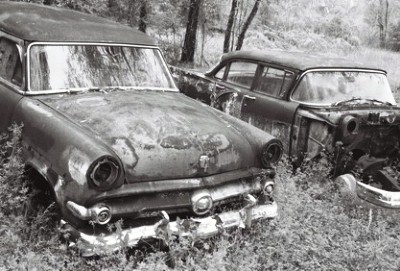
“Have you ever read The Demons? You may know it as The Possessed.” I tug but his grip is stronger this time. “Um, no. I haven’t.” “Politics, you know. Politics is horseshit. It makes liars out of men. And worse. I’ve seen it. Know it to be true.” I’m concerned about my hand and give a hard pull. Richard finally releases me, but is quiet for several moments. “I’d like to ask you to buy me a cup of coffee,” he eventually says. “We could talk for awhile,” “I’m sorry,” I reply. “But I have to go on a field trip. The van will be here any minute.” “I see. That’s too bad. I’ve enjoyed our talk.” Richard holds out his hand and I’m reluctant to take it, but do. “I lost half my penis in Vietnam, but I’m a man. Yessir, a good man.” By way of getting loose I turn abruptly to where the van has just pulled up, saying, “Take care,” as I do. Halfway to the van I look behind me. Richard is about to go around the corner of the building, but sees me and waves. I wave back. At the van a classmate asks me, “What was the deal with that crazy guy?” “He just wanted to talk about Dostoyevsky,” I reply. The student is puzzled: “Talk about what?” I climb into the van, the instructor already beginning a monologue about karst topography and limestone sinks. I close the door and the van pulls away.
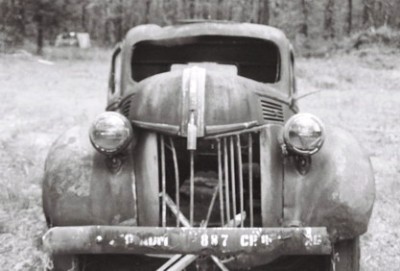

"Hey, remember Steve McQueen? Bullitt?!" I look over at the man on the next bench. I can see that he's tall and missing several teeth. He's holding a 40 ounce can of malt liquor in his right hand and pointing at me with his left. "1968! What kind of car did he have?!" "Car?" I mutter, turning back to glance at the Willamette River, wondering if anything good can come out of a conversation that begins as this one has. "I don't know," I say, frowning. "A Mustang, man!! A damn Mustang!!" He takes a long drink from the can, crushes it in his hand, then reaches into a bag for a fresh one. "Hey!" he exclaims, gesturing toward the woman next to him, "This girl's nothin' but trouble. She's gonna be the death of me. She gets us kicked outta every place we go." The woman, who could be 35 years old or could be 55 years old, laughs, a thin hissing, like air leaking from a tire. She has fewer teeth than her boyfriend, who says, "Shit, the river's the only place we got left. If things don't get better I might haveta throw myself in the drink." I start to say something, but the man smiles broadly and begins to roar with laughter.

Then he suddenly becomes serious: "When my old man died my brother and I got the cabin. Wisconsin. I went up there to drink. Wasn't hurtin' no one. Not hurtin' NO ONE! Then they changed the damn locks. I broke the window and got back in. Shit, it was MY PLACE. They can't keep me outta MY PLACE. Called the damn cops. My own brother. I had guns, but what am I gonna do?! Shoot cops?!" He cackles loudly and begins to imitate a shoot-out: "Bam, bam, bam, rat-a-tat-tat, kaboom!" Then louder, meaner: "Bastard! I'll kill him! If I could find him, I'd kill 'im!" A jogger runs by, glances toward us for an instant, then looks ahead, expressionless. The girlfriend begins hissing again as the man takes another pull on the can. He points at me: "I swear, if things don't start lookin' up, don't get better soon, I'm gonna throw myself in the drink. Jump right in." "That seem's a bit drastic," I offer. He roars again, "Shit, yeah! That's fucking HARSH!" We both look out at the Willamette River. "But I might," he says, quietly. "I just might." A long minute passes. "Steve McQueen!!" I turn away from the river, startled. "Steve McQueen!!" he repeats. "Man, Bullitt!!" I smile and say, "1968." "Yeah! You remember that car?" "That Mustang?" I ask. "Shit, YEAH," he says excitedly. "That's right!! That sweet Mustang. That's DAMN RIGHT!!"


On a wall of the Holocaust Memorial in Washington Park, amongst the pine trees which overlook the city of Portland, Oregon, a short verse is inscribed in stone. Written in 1943 by a nine-year-old girl imprisoned at Sachsenhausen, the four lines read:
Once upon a time there was Elzunia
Dying all alone
Because her daddy is in Majdanek
And in Auschwitz her mommy.
AUGUST 2016 UPDATE: Below is a sketch of a young girl submitted by Jules D. The drawing, bearing the name "Elzunia," was found in an antique store in Kraków, Poland a couple decades ago. It seems likely that it is a tribute to the girl whose poem is inscribed on the Holocaust Memorial, and thus is a moving accompaniment to this post. I thank Jules for allowing me to post it here.
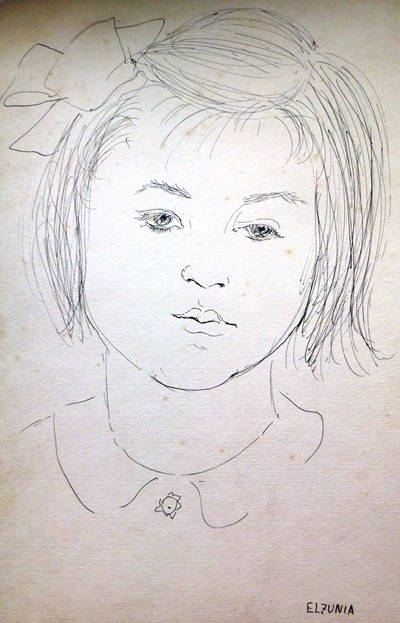
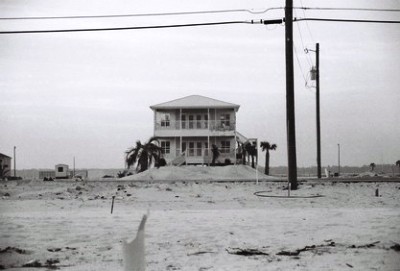
On September 16, 2004, Hurricane Ivan slammed into the Gulf Coast of the United States. The Category 3 hurricane had lost some force by the time it made landfall at approximately 2 AM, but that was little consolation for residents of coastal Alabama and the Florida Panhandle, who had to contend with 125 mph winds and a 16 foot storm surge. The center of the hurricane came ashore near Mobile, AL, but Pensacola, FL, about 35 miles east of the eye of the storm, got hammered. Over 7 months later, the damage done by Ivan could still be seen up and down the Panhandle Coast. Construction was proceeding all around, but destruction lurked in every corner. Countless blue government issue tarps were still nailed to roofs and many windows remained boarded.
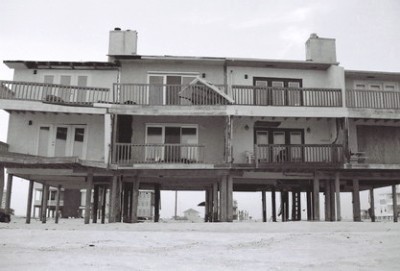
It is, of course, the beach communities that bore the brunt of Hurricane Ivan. Shifting sand and tides make life on these strips of land precarious under the best circumstances. Ivan made life impossible. These photos were taken just west of Fort Walton Beach and, while the hurricane stilts helped to a degree, the devastation was widespread. The majority of homes were badly battered, with shutters hanging loose, stairways gone, and roofs ripped-up. While a few hammers clattered here and there and a power saw or two rang out, many residents had obviously not yet returned to what may have been vacation homes. Most haunting were the broken stumps of hurricane stilts that were visible every so often, the gorgeous homes they had once supported nowhere to be seen.

A few feet beyond where these photos were taken, access was impossible. The road remained buried under several feet of sand and not a structure was visible on the horizon. On this beautiful late-March evening, with a light, warm breeze blowing and the ocean gently lapping at the shore, it was hard to imagine the fury that had torn this neighborhood apart. Some residents might tell you that living in such a place made the risk worth it. Gazing out across the ocean, ankle-deep in perfect sand, gulls wheeling overhead, wrecked homes in every direction, I wouldn't have tried to argue with them.


 You open the door to the musty trailer, top-of-the-line in 1955, and light the kerosene lantern. A few insects immediately begin to work their way through holes in the window screen. The door is warped and swings open with a gust of wind. You stand up and pull it shut, hard, then slide a screwdriver through two strips of metal that used to hold a sliding bolt. You sit on the bed and stare at the backs of your red, swollen hands. How long have you been out here now? Three weeks? A month? All night the fear has been building, growing stronger, more personal, more insistent. You turn off the lantern, lie back on the moldy foam pad and pull the ragged sleeping bag across your chest.
You open the door to the musty trailer, top-of-the-line in 1955, and light the kerosene lantern. A few insects immediately begin to work their way through holes in the window screen. The door is warped and swings open with a gust of wind. You stand up and pull it shut, hard, then slide a screwdriver through two strips of metal that used to hold a sliding bolt. You sit on the bed and stare at the backs of your red, swollen hands. How long have you been out here now? Three weeks? A month? All night the fear has been building, growing stronger, more personal, more insistent. You turn off the lantern, lie back on the moldy foam pad and pull the ragged sleeping bag across your chest.
 The Weather Channel running a story entitled, "Save your pet from heat exhaustion." Man, it's hot. So, here are some photos from cooler times. This is Grand Marais, Minnesota, up by the Canadian Border, sometime last February. Looks good now, doesn't it? I was cold as hell when I took these photos, a brutal north wind coming at me right off Lake Superior. But, let's forget that for now and just admire the ice. Actually, up here we didn't even make it to 70 degrees F today, so I'm not entirely sure what the rest of the country is complaining about. If you want further frosty photos I posted some others
The Weather Channel running a story entitled, "Save your pet from heat exhaustion." Man, it's hot. So, here are some photos from cooler times. This is Grand Marais, Minnesota, up by the Canadian Border, sometime last February. Looks good now, doesn't it? I was cold as hell when I took these photos, a brutal north wind coming at me right off Lake Superior. But, let's forget that for now and just admire the ice. Actually, up here we didn't even make it to 70 degrees F today, so I'm not entirely sure what the rest of the country is complaining about. If you want further frosty photos I posted some others 









 It was night. The desert spread out in all directions. A darkness had fallen so thick that he could no longer see his own feet as they moved steadily under him. How many miles had he come? He didn't know. It was growing cold now and the beads of sweat on his brow stung him as the wind picked up. Above, there was not a star to be seen, the moon nothing more than a memory, or possibly a dream.
It was night. The desert spread out in all directions. A darkness had fallen so thick that he could no longer see his own feet as they moved steadily under him. How many miles had he come? He didn't know. It was growing cold now and the beads of sweat on his brow stung him as the wind picked up. Above, there was not a star to be seen, the moon nothing more than a memory, or possibly a dream.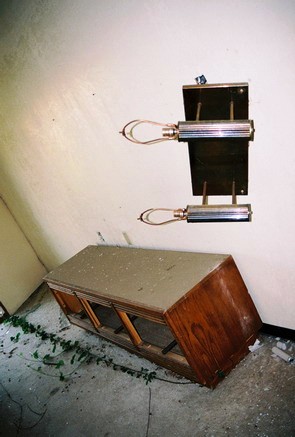 A mistake had been made. Recently, or perhaps a long time ago. He couldn't be sure anymore. But not taking the easy way out had at some point become no way out at all. And this felt not like a crossroads, but a dead end. He turned up his collar against the rising gusts and sat down in the sand, which held a last trace of warmth from the vanished sun. He felt a stone under his hand, lifted it, and threw it into the inky distance. Nothing. He would wait.
A mistake had been made. Recently, or perhaps a long time ago. He couldn't be sure anymore. But not taking the easy way out had at some point become no way out at all. And this felt not like a crossroads, but a dead end. He turned up his collar against the rising gusts and sat down in the sand, which held a last trace of warmth from the vanished sun. He felt a stone under his hand, lifted it, and threw it into the inky distance. Nothing. He would wait.